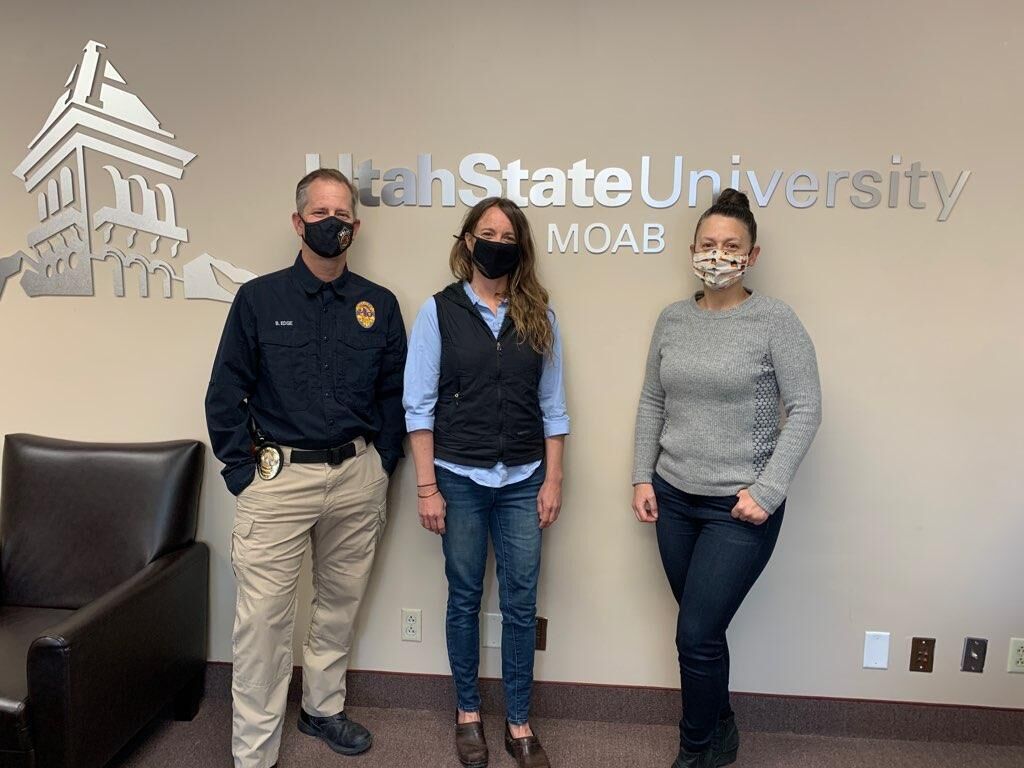Moab resident Katie Creighton studied natural resources and joined the Utah Department of Wildlife Resources because she was interested in natural science. She now supervises other employees in her role as the native aquatics projects leader for the agency, and she’s discovered that she loves helping people learn and develop as much as she loves science and research.
“The more I learn about humans, particularly how they interact in groups—and being a manager of people, watching people grow and achieve goals—that has become something I really love about my job,” Creighton said. Following the recognition of that interest, and with a desire to offer a deeper contribution to the community, Crieghton enrolled as a graduate student in the Social Work Program at Utah State University Moab last year.
This fall she will begin a two-year practicum in partnership with the Moab City Police Department as part of that program. Through the first year of the practicum, she’ll work with the police department and other community social service providers to examine the crisis response network in the Moab area and identify gaps or areas for improvement.
In the second year, Creighton will work to imagine ways to achieve the needed improvements along with community stakeholders.
A widespread trend
“Recently there has been a nationwide call for more collaboration between law enforcement, social workers, first responders, healthcare providers, and other social service practitioners to better address mental and behavioral health and social needs in our communities,” Creighton said in an April 19 press release from USU Moab. “Through this partnership, we hope to identify social needs that are not being adequately addressed within our existing crisis response system and design holistic and compassionate solutions to fill in those gaps.”
The concept of strengthening social services and adjusting emergency response protocols is not new, but it has gained more exposure and support in recent years, in conjunction with the Black Lives Matter movement, scrutiny of police practices, and rising concerns about mental health and substance abuse issues. Eugene, Oregon is the birthplace of a program called Crisis Assistance Helping Out On The Streets, or CAHOOTS, which was founded in 1989. The program works with the Eugene Police Department to provide crisis intervention and response for mental health emergencies and to connect clients with resources for long term management of mental health conditions.
Moab City Police Chief Bret Edge admires the CAHOOTS program and looks forward to learning more about how Moab can implement a similar approach.
“He was really excited about what Eugene does, which is not having police responding to non-criminal calls involving mental health or substance abuse issues,” said Creighton of Edge. “You can get more effective care with people who are specifically trained to deal with these crises—and that allows police to focus on what they’re trained to do.”
Jen Evers, clinical associate social work professor at USU Moab, worked with Edge to create the practicum for Creighton. Evers had long seen the need for stronger connections between the social work program, mental health system, and the criminal justice system, and she was pleased to find that Edge was also eager to advance those connections.
“Edge has had the vision of adding a community responder program to the department and wants to know if the program is feasible and what resources are needed to be successful,” reads the April 19 press release. Edge said the practicum “will be hugely beneficial to our department and the community.”
Creighton noted that the places where programs like CAHOOTS have taken hold are often larger cities with plentiful resources. She hopes that her research on the needs of the Moab area and the programs, protocols, and solutions she helps to generate in the future might serve as a model for other rural or isolated communities interested in improving crisis response.
Community input
Creighton emphasized that she will be gathering, synthesizing and analyzing a wealth of existing knowledge and insight from local social service organizations like the Seekhaven Family Crisis and Resource Center, Moab Solutions, Four Corners Behavioral Health, the Moab Valley Multicultural Center, and Moab Regional Hospital. She also highlighted how important it is to consider input from the individuals and families directly affected by social health crises.
“Talking to advocates of those people who have experienced crises, or talking to the people themselves—that is going to be a really big component of this process,” Creighton said. “As a society we’re recognizing more and more that there are people who have been left out of social services in general. We have to rethink how we design these programs if we want to be more inclusive, and community-based participatory research is one method to achieve that.”
Creighton said she, Edge, and Evers are all excited to begin the practicum and see how it evolves.
“We’re eager to jump into this process and begin brainstorming with the community,” she said.
A unique opportunity
Creighton plans to continue working full-time for the DWR—“I’m still really happy with my current job,” she said—while taking evening courses. She feels good about the positive impacts she’s made in conservation through her work with the DWR—she also feels fortunate to have the opportunity to stay in the town where she lives and maintain her career while pursuing another passion.
“That the Moab campus allows you to get a graduate degree here is really cool. I don’t think there are a lot of small towns that have that option,” she acknowledged. She’s not certain how she’ll use her social work degree once she’s completed it, but the fact that the opportunity to earn it exists in Moab was extra encouragement for her to make the commitment.
“There’s been a call for social action,” Creighton said, “and I don’t know who else is going to do it besides people who are able to. I see this graduate program and practicum as an opportunity for me to gain experience and education to play a small part in that common goal.”




